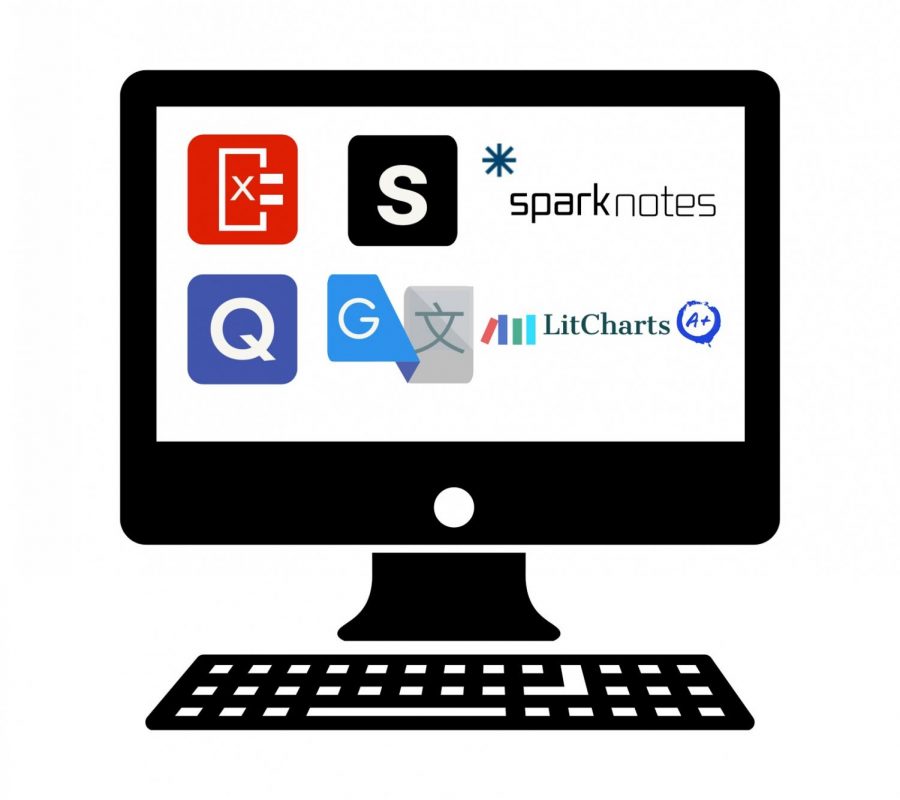Academic integrity suffers in age of COVID-19, distance learning
In 2020, information is at the tips of our fingers. With the simple click of a button, a student can easily find formulas, tutorials, translations and summaries that can serve as blessings at some times, and curses at others. While all of these resources can be highly beneficial, they may also impede true learning–especially in the midst of the COVID-19 pandemic.
Cheating on assignments, regardless of what kind they are, blatantly violates the academic integrity policy adopted at all schools. And in the time of distance learning, cheating has arguably never been any more effortless to conduct. In only the first month of school, unfortunately, I have recognized that this fact is coming to manifestation in Staples itself.
Although the majority of my tests are not open-book, there is an unfair advantage that only the online students enjoy during a hybrid day: the wonderful power of the internet and the various applications that can be used to cheat on tests.
In my classrooms, teachers have continued to distribute assessments as usual. Many of my teachers give the same test on the same day to students–with half of the class in person, and the other half participating via Zoom. However, other instructors have adapted to this new environment by changing the way tests are administered, allowing classes to use external resources and revising grading scales accordingly.
Although the majority of my tests are not open-book, there is an unfair advantage that only the online students enjoy during a hybrid day: the wonderful power of the internet and the various applications that can be used to cheat on tests. Some of these tools include Photomath, Spark Notes, Slader and LitCharts, among others.
A study conducted by Visual Objects revealed that 52% of students anticipate widespread cheating and breaches of academic integrity while experiencing distance learning. Presently, when assessments are announced, many of my peers remark that, “oh, you’re lucky, you can take it online,” or, “it’s online, so it doesn’t really matter.” Some students may have bid farewell to frantic, sleepless nights of cramming in studies because of the COVID-19 pandemic, even at Staples. Upholding academic standards have been replaced with an unethical pursuit of higher grades at the cost of true education and personal character.
Photomath, a popular mobile app that completes math problems by scanning photos, has experienced heightened usage during the COVID-19 pandemic. In Italy, when schools began distance learning, Photomath saw an increase of 90% above regular patterns there. This dramatic increase in Photomath usage could be attributed to the challenges we face with remote learning.
Despite the breaches of academic integrity that plague schools nationwide, there are alternatives that teachers and administrators can implement in order to ensure that students are able to perform at a high level without the temptation to cheat. Some organizations, like Turnitin.com, suggest that instructors should personalize their assessments to prevent students from simply searching up the question/prompt online. Others, like Inside Higher Ed, encourage the institution of tests that measure conceptual proficiency, such as case studies, scenario-based projects and word problems. Such assessments could better evaluate students’ competence in skills, prompting them to demonstrate their knowledge in ways that cannot be reliant upon cheating mechanisms.
Attending classes in person only a few times per week may impede students from receiving the same level of education during a normal year. In addition, some students find it difficult to concentrate for extended periods of time when learning remotely. Consequently, being honorable and resisting the urge to cheat can be outweighed by the stress of grades, GPAs and the college process.
Ultimately, action must be taken inside (and outside) of Staples to ensure that our academic integrity remains intact during the pandemic. Although doing so may not appeal to students who actively cheat on assessments, it is necessary to enforce stricter protocols to guarantee that students are still learning.

Editor-in-Chief Julia Herlyn ’23 enjoys music. She’s been playing violin for nine years both in school with the Symphonic Orchestra and Chamber Orchestra...














































![[Jan. 2017 Features] Cheating Academic integrity lost. Consquences of an act punishable by failing goes unenforced.](https://www.inklingsnews.com/wp-content/uploads/2017/02/Screen-Shot-2017-02-27-at-12.47.24-PM-475x353.png)

![[Jan. 2017 Features] Cheating Academic integrity lost. Consquences of an act punishable by failing goes unenforced.](https://www.inklingsnews.com/wp-content/uploads/2017/02/Screen-Shot-2017-02-27-at-12.47.24-PM.png)









